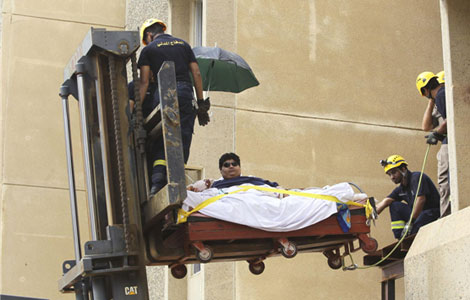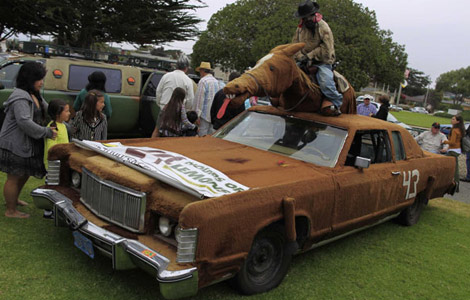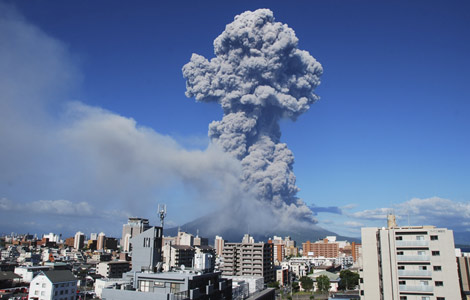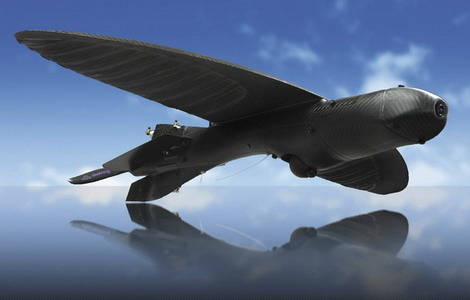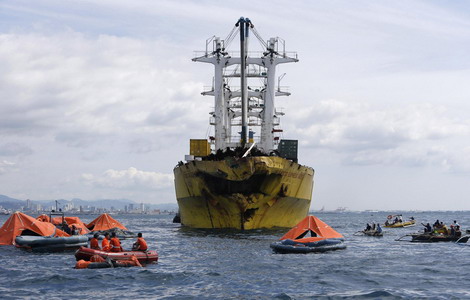

Pyongyang slams ROK president for unnecessary warlike comments
Seoul and Pyongyang threw cold water on the positive momentum of relations on the Korean Peninsula on Tuesday, while China and other parties continued efforts to mediate between the two sides.
The Democratic People's Republic of Korea took a verbal swipe at the Republic of Korea on Tuesday, saying that remarks made by ROK President Park Geun-hye on the eve of her country's joint military drill with the United States were unnecessarily warlike and had harmed the atmosphere of reconciliation on the peninsula.
However, analysts said that the exchange of words would not harm reconciliation efforts, and that a certain amount of tension was to be expected between the ROK and DPRK as they attempt to build mutual trust.
Pyongyang objected to comments made by Park to her National Security Council on Monday, which met as the annual joint US-ROK exercise began.
She urged ROK officials to get "combat-ready, regardless of change in south-north relations and the situation in surrounding areas" and said "it is necessary to get ready for a war to ensure peace", the Yonhap news agency said.
A spokesman for the DPRK's Committee for the Peaceful Reunification of Korea denounced Park's remarks in a statement on Tuesday, saying the comments "chill the hard-won atmosphere of dialogue between the north and the south and go against the trend of the times for peace".
He urged Seoul authorities not to misjudge the sincerity and patience of Pyongyang.
The reaction of the DPRK was muted in contrast with previous years, said analysts. On past occasions, Pyongyang might have directly criticized Seoul for holding joint military exercises with the US, and so in contrast, its response to Park's words was mild.
The exchange has not hindered the ongoing efforts of China and other parties to ensure peace and stability on the peninsula.
Former senior officials and academics from China and the ROK held a forum on Tuesday in Beijing to discuss the denuclearization issue on the peninsula, Yonhap said.
On Monday, China's top political adviser Yu Zhengsheng also held talks on the nuclear issue with the visiting ROK officials and academics, who were led by former ROK prime minister Lee Soo-sung.
Meanwhile, the US State Department special envoy for human rights in the DPRK Robert King is paying a visit to China to discus DPRK-related issues.
Following King, United Nations chief Ban Ki-moon will pay a visit to the ROK and hold talks with Park.
The eased situation on the Peninsula offers a favorable atmosphere for all parties to make new mediation efforts on the issue, said Wang Fan, an international affairs professor at China Foreign Affairs University.
The DPRK has sent its first draft of a document suggesting a joint committee to discuss reopening the industrial park in Kaesong. An official in Seoul said there were not many differences between the two sides.
"Seoul has examined the first draft sent by Pyongyang and confirmed it is not too different from the general plan being pursued by our government," Yonhap cited the official as saying.
After considering Pyongyang's proposal and adding a few ideas, Seoul will be able to send a revised draft back to Pyongyang, he added.
This comment reveals that a landmark agreement to reopen the industrial park is in the pipeline, bringing the parties closer to an early normalization of the industrial zone, commented the agency.
The general trend on the Korean Peninsula is toward an easing of relations between the two parties, said Chen Qi, a professor of international relations from Tsinghua University. However, he said it is too early to say whether the ROK and the DPRK can eventually move their relationship to a new level.
Considering the friction, the two sides should avoid provocative words and actions, he added.

